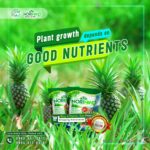
The Importance of Nutrients for Plant Growth
Plant growth is a complex process that hinges on the availability of essential nutrients. These nutrients are the building blocks that plants need to develop, reproduce, and carry out their vital functions. Ensuring that plants receive a balanced diet of these nutrients is crucial for achieving healthy, vigorous growth and optimal yields.
Plants require a mix of macronutrients and micronutrients to thrive. Macronutrients, which are needed in larger quantities, include nitrogen (N), phosphorus (P), and potassium (K). Each of these plays a distinct role in plant development. Nitrogen is a key component of chlorophyll, the molecule responsible for photosynthesis, and is essential for leafy growth. Phosphorus is vital for energy transfer and root development, while potassium regulates water uptake and enzyme activation, supporting overall plant health.
In addition to these primary macronutrients, secondary macronutrients like calcium (Ca), magnesium (Mg), and sulfur (S) are also critical. Calcium is necessary for cell wall structure and stability, magnesium is a core element of chlorophyll, and sulfur is involved in protein synthesis and enzyme function. These nutrients work together to support various physiological processes within the plant.
Micronutrients, though required in smaller amounts, are equally important for plant health. These include iron (Fe), manganese (Mn), zinc (Zn), copper (Cu), molybdenum (Mo), boron (B), and chlorine (Cl). Each micronutrient has specific functions, such as enzyme activation, hormone regulation, and redox reactions, which are essential for plant growth and development. A deficiency in any of these nutrients can lead to stunted growth, poor yields, and susceptibility to diseases.
Soil is the primary source of nutrients for plants, and its health directly influences nutrient availability. Factors such as soil pH, texture, organic matter content, and microbial activity all play a role in nutrient uptake. Maintaining a balanced and fertile soil environment is key to ensuring that plants can access the nutrients they need. Practices such as crop rotation, cover cropping, and the use of organic matter like compost can enhance soil health and nutrient availability.
Fertilizers play a significant role in supplementing soil nutrients, particularly in intensive agricultural systems where nutrient depletion can occur. However, it is important to use fertilizers judiciously to avoid negative environmental impacts such as nutrient runoff and water pollution. Organic fertilizers, which are derived from natural sources, offer a sustainable alternative to synthetic options. They not only provide essential nutrients but also improve soil structure and microbial activity, leading to long-term soil fertility.
Norinano products are designed to support optimal plant nutrition in a sustainable manner. Their range of organic fertilizers is formulated to deliver a balanced mix of macronutrients and micronutrients, ensuring that plants receive all the essential elements they need for healthy growth. Norinano’s soil amendments, such as biochar and compost, enhance soil fertility and structure, promoting better nutrient uptake and water retention.
Moreover, Norinano’s plant health products include biostimulants that can improve nutrient efficiency and resilience against stress. These products help plants utilize available nutrients more effectively, enhancing growth and yield even in challenging conditions. By integrating Norinano’s solutions into their farming practices, growers can achieve robust plant health and sustainable productivity.
The availability of good nutrients is fundamental to plant growth. A balanced supply of macronutrients and micronutrients, supported by healthy soil and sustainable fertilization practices, ensures that plants can reach their full potential. By leveraging innovative products like those offered by Norinano, farmers and gardeners can foster a thriving, productive, and sustainable growing environment.



